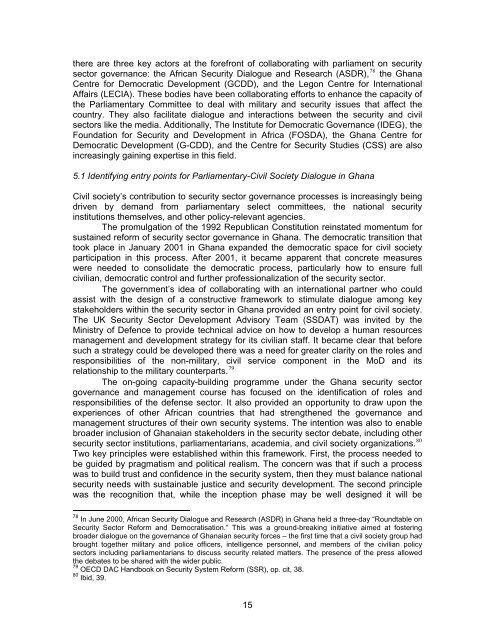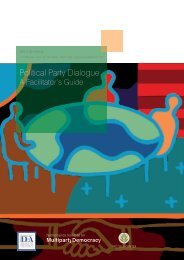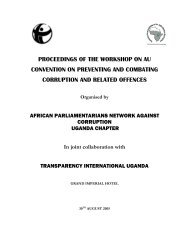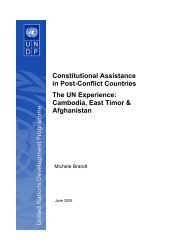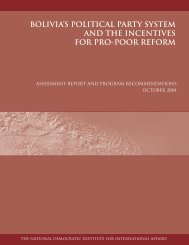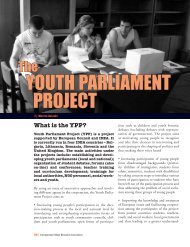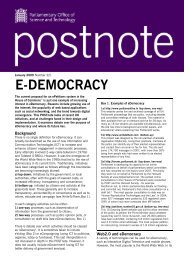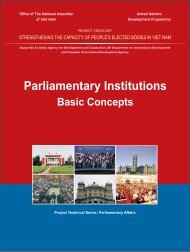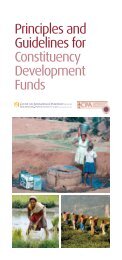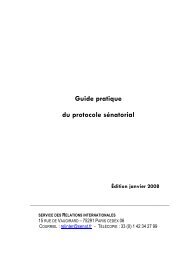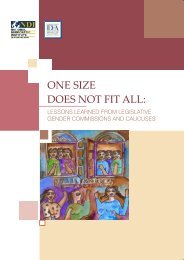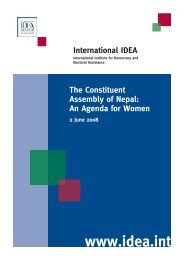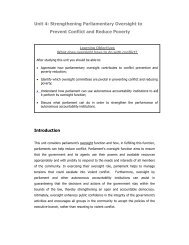Parliamentary Oversight of the Security Sector: Lessons from Ghana
Parliamentary Oversight of the Security Sector: Lessons from Ghana
Parliamentary Oversight of the Security Sector: Lessons from Ghana
Create successful ePaper yourself
Turn your PDF publications into a flip-book with our unique Google optimized e-Paper software.
<strong>the</strong>re are three key actors at <strong>the</strong> forefront <strong>of</strong> collaborating with parliament on securitysector governance: <strong>the</strong> African <strong>Security</strong> Dialogue and Research (ASDR), 78 <strong>the</strong> <strong>Ghana</strong>Centre for Democratic Development (GCDD), and <strong>the</strong> Legon Centre for InternationalAffairs (LECIA). These bodies have been collaborating efforts to enhance <strong>the</strong> capacity <strong>of</strong><strong>the</strong> <strong>Parliamentary</strong> Committee to deal with military and security issues that affect <strong>the</strong>country. They also facilitate dialogue and interactions between <strong>the</strong> security and civilsectors like <strong>the</strong> media. Additionally, The Institute for Democratic Governance (IDEG), <strong>the</strong>Foundation for <strong>Security</strong> and Development in Africa (FOSDA), <strong>the</strong> <strong>Ghana</strong> Centre forDemocratic Development (G-CDD), and <strong>the</strong> Centre for <strong>Security</strong> Studies (CSS) are alsoincreasingly gaining expertise in this field.5.1 Identifying entry points for <strong>Parliamentary</strong>-Civil Society Dialogue in <strong>Ghana</strong>Civil society’s contribution to security sector governance processes is increasingly beingdriven by demand <strong>from</strong> parliamentary select committees, <strong>the</strong> national securityinstitutions <strong>the</strong>mselves, and o<strong>the</strong>r policy-relevant agencies.The promulgation <strong>of</strong> <strong>the</strong> 1992 Republican Constitution reinstated momentum forsustained reform <strong>of</strong> security sector governance in <strong>Ghana</strong>. The democratic transition thattook place in January 2001 in <strong>Ghana</strong> expanded <strong>the</strong> democratic space for civil societyparticipation in this process. After 2001, it became apparent that concrete measureswere needed to consolidate <strong>the</strong> democratic process, particularly how to ensure fullcivilian, democratic control and fur<strong>the</strong>r pr<strong>of</strong>essionalization <strong>of</strong> <strong>the</strong> security sector.The government’s idea <strong>of</strong> collaborating with an international partner who couldassist with <strong>the</strong> design <strong>of</strong> a constructive framework to stimulate dialogue among keystakeholders within <strong>the</strong> security sector in <strong>Ghana</strong> provided an entry point for civil society.The UK <strong>Security</strong> <strong>Sector</strong> Development Advisory Team (SSDAT) was invited by <strong>the</strong>Ministry <strong>of</strong> Defence to provide technical advice on how to develop a human resourcesmanagement and development strategy for its civilian staff. It became clear that beforesuch a strategy could be developed <strong>the</strong>re was a need for greater clarity on <strong>the</strong> roles andresponsibilities <strong>of</strong> <strong>the</strong> non-military, civil service component in <strong>the</strong> MoD and itsrelationship to <strong>the</strong> military counterparts. 79The on-going capacity-building programme under <strong>the</strong> <strong>Ghana</strong> security sectorgovernance and management course has focused on <strong>the</strong> identification <strong>of</strong> roles andresponsibilities <strong>of</strong> <strong>the</strong> defense sector. It also provided an opportunity to draw upon <strong>the</strong>experiences <strong>of</strong> o<strong>the</strong>r African countries that had streng<strong>the</strong>ned <strong>the</strong> governance andmanagement structures <strong>of</strong> <strong>the</strong>ir own security systems. The intention was also to enablebroader inclusion <strong>of</strong> <strong>Ghana</strong>ian stakeholders in <strong>the</strong> security sector debate, including o<strong>the</strong>rsecurity sector institutions, parliamentarians, academia, and civil society organizations. 80Two key principles were established within this framework. First, <strong>the</strong> process needed tobe guided by pragmatism and political realism. The concern was that if such a processwas to build trust and confidence in <strong>the</strong> security system, <strong>the</strong>n <strong>the</strong>y must balance nationalsecurity needs with sustainable justice and security development. The second principlewas <strong>the</strong> recognition that, while <strong>the</strong> inception phase may be well designed it will be78 In June 2000, African <strong>Security</strong> Dialogue and Research (ASDR) in <strong>Ghana</strong> held a three-day “Roundtable on<strong>Security</strong> <strong>Sector</strong> Reform and Democratisation.” This was a ground-breaking initiative aimed at fosteringbroader dialogue on <strong>the</strong> governance <strong>of</strong> <strong>Ghana</strong>ian security forces – <strong>the</strong> first time that a civil society group hadbrought toge<strong>the</strong>r military and police <strong>of</strong>ficers, intelligence personnel, and members <strong>of</strong> <strong>the</strong> civilian policysectors including parliamentarians to discuss security related matters. The presence <strong>of</strong> <strong>the</strong> press allowed<strong>the</strong> debates to be shared with <strong>the</strong> wider public.79 OECD DAC Handbook on <strong>Security</strong> System Reform (SSR), op. cit, 38.80 Ibid, 39.15


